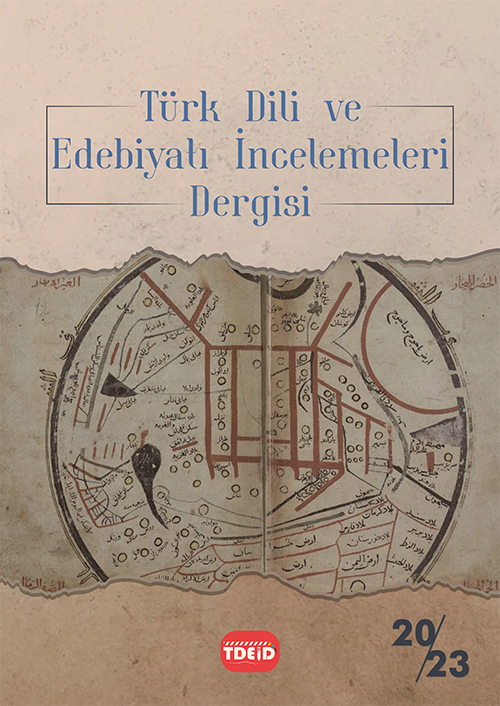Meanings of the word "gut" in Kutadgu Bilig
DOI:
https://doi.org/10.5281/zenodo.12625150Keywords:
Kutadgu Bilig, gut, metaphorAbstract
When people look at the words they use throughout their lives, it is seen that they do not use every word in the first meaning of the dictionary, but they attribute metaphorical and abstract meanings to them. They have managed to get rid of the monotony used with the first meanings of words and present them in a lively style. As a matter of fact, Turkish language is a language open to abstract concepts and figurative meanings due to its structure. We see this from the first examples of the Turkish language we have. Apart from figurative and abstract meanings, we encounter polysemous elements. We also encounter polysemy, abstract and figurative meanings in Karakhanid Turkish, which is the Middle Turkish period, and its work Kutadgu Bilig. As an example of this, the word gut in Kutadgu Bilig can be given. In Kutadgu Bilig, the word intestine has multiple meanings, abstract and metaphorical uses apart from its basic meaning. In Kutadgu Bilig, the word intestine is not used as a human organ, but it is used in the meanings of sparing, merciful, compassionate, devoted, close, loyalty, sincerity, loyal, heartfelt (lovingly), loyalty, beloved (address), willingly (from the heart), reverence, affection, love and ihlas and goodness. In this study, the meanings of the word intestine in Kutadgu Bilig are determined and examples are given.
References
Akçeşme, Furkan(2019). Karahanlı Türkçesinin Söz Varlığı, Yüksek Lisans Tezi, Kırıkkale: Kırıkkale Üniversitesi Sosyal Bilimler Enstitüsü.
Atalay, Besim (1985). Divanü Lugat-it Türk Tercümesi, Ankara: Türk Tarih Kurumu Basımevi.
Başdaş, Cahit (2004). Türkçe Organ Adlarında Kelime Sonu -k Ünsüzü ve Çokluk, Sosyal Bilimler Araştırma Dergisi, S 5, s. 53-64.
Caferoğlu, Ahmet (1968). Eski Uygur Türkçesi Sözlüğü, İstanbul: Türk Dil Kurumu Yayınları.
Çubukçu, Melek (2020). Kutadgu Bilig’de sevgi ifadeleri. Çukurova Araştırmaları, C 6, S 2, s. 314- 339.
Ekmen, Botan Cudi (2018). Eski Uygur Türkçesi Metinlerinde Organ Adları, Yüksek Lisans Tezi, İstanbul: İstanbul Üniversitesi Sosyal Bilimler Enstitüsü.
Erol, Hülya Arslan (2014). Eski Türkçeden Eski Anadolu Türkçesine Anlam Değişmeleri, Ankara: Türk Dil Kurumu Yayınları.
Gülensoy, Tuncer (2007). Türkiye Türkçesindeki Türkçe Sözcüklerin Köken Bilgisi Sözlüğü -Etimolojik Sözlük Denemesi- I (A-N), Ankara: Türk Dil Kurumu Yayınları.
Güner, Galip (2008). Karahanlı Türkçesinde Fiil, Doktora Tezi, Kayseri: Erciyes Üniversitesi Sosyal Bilimler Enstitüsü.
Özkan, Nevzat. Sucuk Sözü Üzerine, Dil Araştırmaları, Güz 2020/27: 21-29.
Toparlı, Recep (1993). Kıpçak Türkçesi Sözlüğü, Erzurum.
Tarama Sözlüğü I (A-B)(2019). Türk Dil Kurumu Yayınları: Ankara.
Türkçe Sözlük A-J (2023). Türk Dil Kurumu Yayınları: Ankara.
Türkçe Sözlük K-Z (2023). Türk Dil Kurumu Yayınları: Ankara.
Türkiye Diyanet Vakfı İslâm Ansiklopedisi 26.cilt Kutagu Bilig Maddesi s.478.
Ünlü, Suat (2012). Harezm Altınordu Türkçesi Sözlüğü, Konya: Eğitim Kitabevi.
Ünlü, Suat (2013). Çağatay Türkçesi Sözlüğü, Konya: Eğitim Kitabevi.
Üşenmez, Emek (2006). Karahanlı Türkçesi Sözlüğü, Yüksek Lisans Tezi, Kütahya: Dumlupınar Üniversitesi Sosyal Bilimler Enstitüsü.
Hacip, Yusuf Has. Kutadgu Bilig, Gençlik Spor Yayınları (Günümüz Türkçesine uyarlayan Muzaffer Tunçel), Ankara, Aralık 2019.
WordPress.com (Erişim Tarihi: 22 Ocak 2024). kutadgubilig.pdf (wordpress.com)
Downloads
Published
How to Cite
Issue
Section
License
Copyright (c) 2024 Türk Dili ve Edebiyatı İncelemeleri Dergisi

This work is licensed under a Creative Commons Attribution 4.0 International License.







